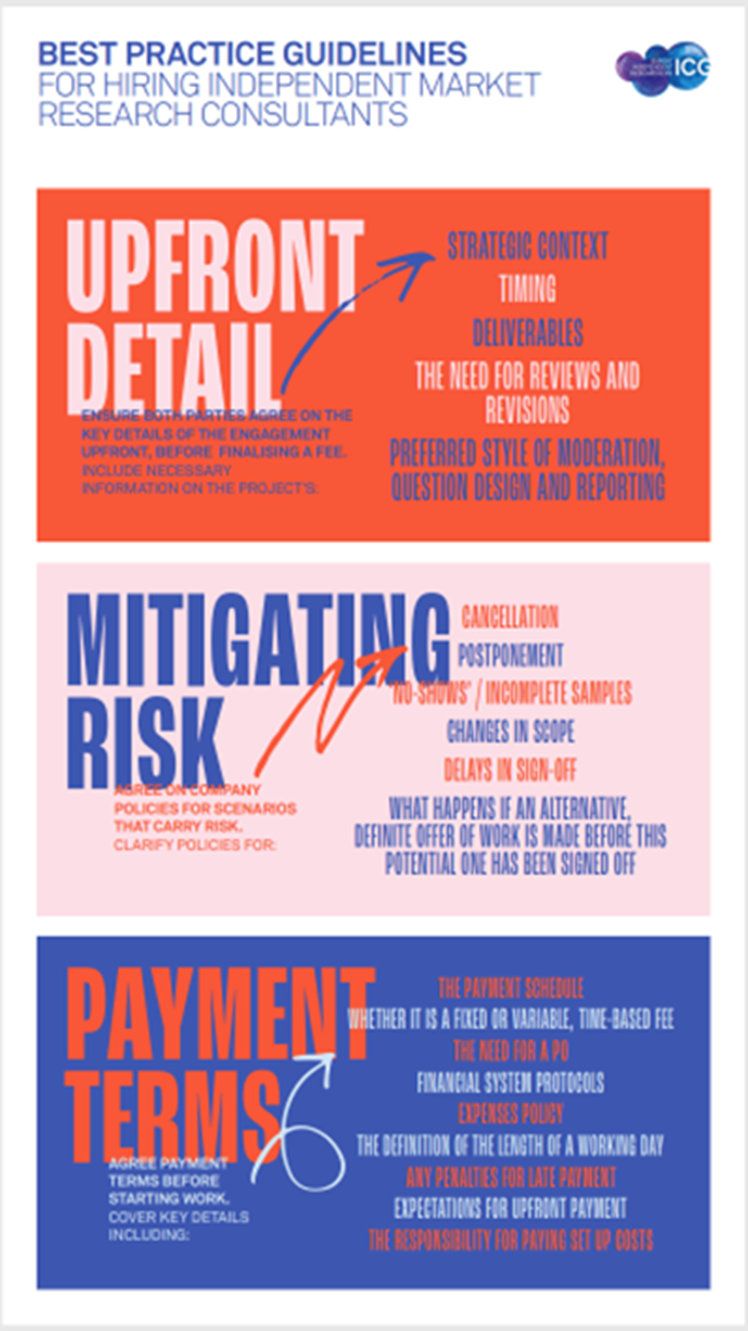What is best practice in hiring independent researchers?

The subject of best practice in hiring independent researchers is close to my heart. Over the years I have been both an independent researcher myself and hired them for my own client projects. While many industries benefit from well-established guidelines for hiring independent consultants, I have noticed a degree of ambiguity and competing notions of what should be deemed acceptable or not when it comes to market research. This lack of clarity can result in problems for both parties.
My decision to spearhead this initiative to define best practice was inspired by the experiences of several Independent Consultants Group (ICG) members. For those who don’t know, the ICG is an international business network and resource for independent researchers – they share ideas, contacts and help solve each other’s work challenges. After the Covid-19, I noticed an increase in the number of issues raised in the ICG email forum.
The problems that independent researchers were encountering varied from clients postponing or cancelling projects after work had started (without paying any fees), to increasing the project scope and deliverables (again without increasing the fee) and the imposition of lengthy payment terms (to name a few). I decided to work with ICG members and the broader research industry to address the problem. Together we developed a set of guidelines to help nurture more productive and happier working relationships between both parties.
To develop our best practice guidelines, we made multiple lines of enquiry over several months. First, we conducted an online qualitative discussion with both clients and independent research consultants (Further, which kindly shared ideas, their online qual platform Together and generously sponsored the initiative). Then we ran a webcam, crowd-sourced discussion with 25 ICG members via Zoom. After each stage, the draft guidelines were refined. Finally, we did a survey with 242 independent researchers and hirers of independent researchers (kindly run by ICG member Nik Harta of Yolo Communications). The survey validated our guidelines. You can read about the full project here.
The guidelines cover three aspects of a typical engagement. All of them address the central need to establish clarity in terms of expectations between parties before work starts:
- Ensuring the scope of the engagement is defined upfront
- Pre-emptively mitigating against risky scenarios
- Clarifying payment terms in advance.
The implications
We believe that researchers and the companies that hire them have a shared responsibility to discuss upfront the key details that need to be agreed upon. All too often this doesn’t happen. We hope that by shining a light on best practice, these critical conversations will happen more and there will be a lower risk of there being any problems.
In the time-pressured world of market research, it’s easy to leave details in the engagement unsaid. For example, according to our survey only 15% of researchers state a cancellation or postponement policy upfront, only 51% agree payment terms in advance and only 36% use a statement of work document. But by agreeing on the details upfront (or at least sharing a set of terms and conditions) the working relationship will run more smoothly. This is particularly relevant for new engagements, when the working relationship has not yet been fully established. It will benefit both parties and reduce the risk of issues if our best practice checklist is completed.
We urge hirers and independent researchers to share and agree on their policy before starting work, so that misunderstandings can be avoided. This is really important because both parties need each other. Agencies need independent researchers to handle the ebbs and flows of work pipelines,and researchers need regular, repeat business. By following these guidelines we believe the industry will function even better.

Tom Woodnutt is a member of the Independent Consultants Group (ICG) and founder of Feeling Mutual.
More information on the research can be found here.

We hope you enjoyed this article.
Research Live is published by MRS.
The Market Research Society (MRS) exists to promote and protect the research sector, showcasing how research delivers impact for businesses and government.
Members of MRS enjoy many benefits including tailoured policy guidance, discounts on training and conferences, and access to member-only content.
For example, there's an archive of winning case studies from over a decade of MRS Awards.
Find out more about the benefits of joining MRS here.













0 Comments